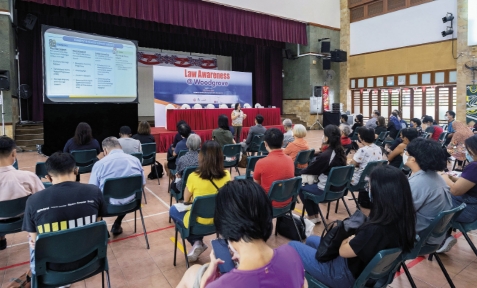2022 was a busy and fruitful year for the Family Justice Courts (FJC). The theme of our Workplan 2022 was ‘Let’s Go’. It reflected that we were implementing initiatives, working and translating our ideas into real-world solutions and fine-tuning them along the way. Through this process, we strove to transform Therapeutic Justice (TJ) from a vision into something that is practised in all our cases.
As the Court of Appeal has recognised, TJ is not merely an ideal; it is a necessity and is intensely practical. Proceedings in the FJC are unique because the relationship between the parties, and between the parties and their children, continue long after court proceedings conclude. Thus, family disputes require a justice system that promotes healing and problem-solving. Our work in TJ is therefore immensely important.
FJC’s initiatives and achievements
Our caseload in 2022 increased by 3%, including a 17% increase in probate cases. Notwithstanding that, our general rate of disposition increased as well—a reflection of the concerted efforts of our team in their work. There was also a 3% increase (from 60% to 63%) in the proportion of divorce applications filed under the Simplified Track, where parties agree on the divorce and the ancillary matters. This is a positive indication that our efforts in encouraging and helping divorcing parties to resolve their affairs amicably are bearing fruit.
Aside from hearing cases, the FJC has pursued several initiatives. These fall into three categories.
The first is creating a multi-disciplinary environment to further TJ by tackling the social, psychological and other challenges that underlie family disputes. Building on our work and experience over the last two years in the implementation of TJ, we embarked on a TJ Deep Dive to further our efforts in this area. Further, in line with our multi-disciplinary approach, we inked a Memorandum of Understanding with the College of Psychiatrists, Academy of Medicine, Singapore, the Singapore Association for Counselling and the Singapore Psychological Society to set up a private-sector Panel of Therapeutic Specialists. This specialist panel will provide a variety of specialised therapeutic services to families who come through the FJC and are willing to undergo private consultations that would meet their specific needs. Similarly, we launched an updated version of the Panel of Financial Experts scheme, which assists the Court by providing equitable and objective valuations of the matrimonial assets under contest, thereby enabling justice to be administered more effectively and efficiently. The updated version of the scheme includes improved processes, the addition of probate applications and an expanded panel of financial experts. We also adopted a TJ Best Practice Guide among family judges, which expounds standards of conduct and expectations for all participants in the family justice system.
The second is strengthening and facilitating court processes, settlement and enforcement. These efforts ultimately enhance access to justice. To this end, we worked to bring services such as filing applications to community touchpoints in the heartlands. For instance, self-represented parties are able to file applications for maintenance enforcement at ServiceSG Centre Our Tampines Hub and ServiceSG Centre One Punggol. We also introduced the Electronic Template Statements initiative for fresh maintenance cases to assist and guide self-represented parties to fill all necessary and relevant information and documents in a single consolidated form, which will then be used at the trial.
The third is fortifying judges’ and lawyers’ capacities and capabilities to handle family disputes of growing capacity. We held our third run of the Family Judges Learning Week, where the focus was on training our family judges on TJ practices and techniques as well as a host of other multi-disciplinary topics. We are also working with the Singapore Academy of Law to offer the second run of the Family Therapeutic Justice Certification Programme, which is a voluntary professional certification course for family lawyers.
Looking forward
The theme for 2023’s Workplan is ‘Keep it Up!’. It is an encouragement to all stakeholders in our TJ journey, including judges, court staff and lawyers, for all the good work done.
Following our Deep Dive, we are working on ideating and operationalising TJ on a broader scale within our court operations and structure. This includes introducing elements of TJ in proceedings before the Youth Courts, which handle child protection, youth offences, and other cases involving children and young persons. The Family Justice Rules will also be simplified, making them more streamlined and efficient.
I am confident that with our sustained efforts, we will be able to fully transform our system of family justice to deliver justice that heals.

Debbie Ong
Presiding JudgeFamily Justice Courts







